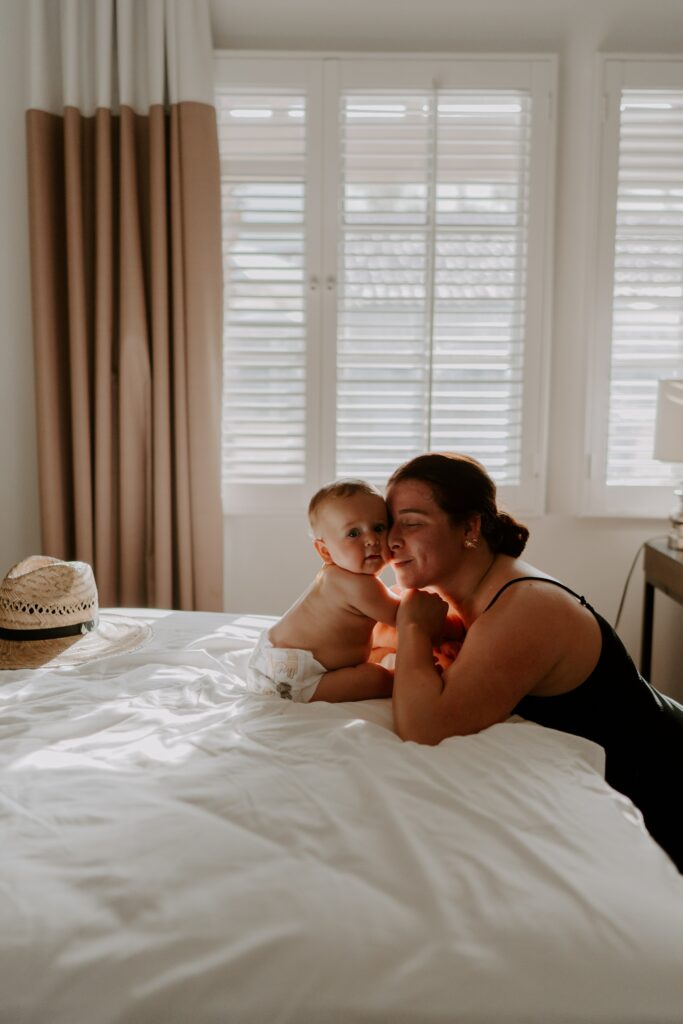Bringing a new life into the world is a profoundly transformative experience, but it can also be incredibly challenging. Many new mothers experience a range of emotions after childbirth, from joy and fulfillment to exhaustion and stress.
However, for some, these feelings can become more complex and overwhelming, leading to a condition known as postpartum depression.
In this article, we will explore the symptoms of depression common in new moms and offer strategies to help them cope and find support.

Symptoms of Postpartum Depression
- Persistent Sadness: One of the primary signs of postpartum depression is a persistent feeling of sadness that lingers beyond the expected “baby blues.” This sadness can be overwhelming and may not have an apparent cause.
- Fatigue: New mothers are naturally tired due to disrupted sleep patterns and the demands of caring for a newborn. However, in postpartum depression, fatigue can reach extreme levels, leading to excessive exhaustion that doesn’t improve with rest.
- Loss of Interest: Women with postpartum depression often lose interest in activities they once enjoyed. Hobbies, socializing, and self-care may take a back seat to the responsibilities of motherhood.
- Changes in Appetite: Appetite can fluctuate dramatically, with some women experiencing an increase in emotional eating, while others lose their appetite entirely.
- Feelings of Guilt: New moms with postpartum depression often grapple with intense guilt and self-doubt. They may feel inadequate as mothers and believe they are failing their newborns.
- Irritability and Anxiety: Mood swings and heightened anxiety can be common in postpartum depression. New mothers may find themselves becoming easily irritated, anxious, and even panicky.
- Difficulty Bonding: Some women with postpartum depression may have difficulty bonding with their newborns. They may feel disconnected or distant from their babies.
- Physical Symptoms: Physical symptoms, such as headaches, digestive problems, and muscle pain, can be linked to postpartum depression. These symptoms often result from the stress and anxiety associated with the condition.
Coping Strategies for New Moms
- Seek Support: The first step in dealing with postpartum depression is seeking support. Talk to your partner, family members, or close friends about your feelings. Don’t hesitate to reach out for professional help. Therapists and counselors can provide guidance and emotional support.
- Self-Care: Prioritize self-care, even if it means taking a short break while someone else looks after the baby. Activities like taking a warm bath, reading a book, or going for a walk can help alleviate stress and recharge your emotional well-being.
- Maintain a Healthy Diet and Exercise: Proper nutrition and exercise are crucial for mental health. Ensure you’re eating well-balanced meals and engaging in light physical activity, with your healthcare provider’s guidance, to boost your mood.
- Rest When You Can: Sleep deprivation is a significant contributor to postpartum depression. Try to rest when your baby naps, and ask for help from your support network to ensure you get enough sleep.
- Join Support Groups: Consider joining a postpartum support group or an online forum where you can connect with other new moms experiencing similar challenges. Sharing your experiences and receiving advice from others can be reassuring.
- Therapy and Medication: In severe cases, therapy or medication may be recommended. Talk to a mental health professional who specializes in postpartum depression to explore your options.
- Communicate with Your Partner: Open and honest communication with your partner is essential. Share your feelings, and let them know what they can do to support you better.
- Set Realistic Expectations: It’s important to set realistic expectations for yourself as a new mom. You don’t need to be perfect, and it’s okay to ask for help when you need it.
The Importance of Seeking Help
Postpartum depression is a significant mental health issue that affects not only the mother but also the entire family.
It’s crucial to recognize that seeking help is a sign of strength, not weakness. By addressing the symptoms early and receiving help from a qualified depression specialist, new moms can improve their mental health and enjoy their journey into motherhood.
What Can Happen if You or a Loved One Delays Seeking Help
Delaying seeking help for postpartum depression can have serious consequences for both the new mom and her baby. Here are some of the potential outcomes of not addressing postpartum depression promptly:
- Worsening Symptoms: Postpartum depression often doesn’t go away on its own. Instead, the symptoms can intensify over time, making it even more challenging to cope.
- Impact on Mother’s Well-Being: Delaying help can lead to prolonged emotional suffering for the new mom. This may affect her ability to enjoy the early stages of motherhood and her overall quality of life.
- Strained Relationships: Unaddressed postpartum depression can strain relationships with a partner, family, and friends. Irritability, mood swings, and feelings of guilt can create tension and distance.
- Negative Effects on the Baby: Infants are highly attuned to their mothers’ emotions. If a mother is struggling with postpartum depression, it can affect her ability to bond with her baby, leading to potential developmental and emotional challenges for the child.
- Chronic Depression: If left untreated, postpartum depression can develop into chronic depression, a more persistent and long-lasting condition that requires more intensive treatment.
- Isolation: A new mom with postpartum depression may become increasingly isolated, avoiding social interactions and support. This isolation can exacerbate feelings of loneliness and despair.
- Physical Health Issues: Prolonged stress and untreated mental health issues can contribute to physical health problems, including headaches, digestive issues, and a weakened immune system.
- Decreased Ability to Care for the Baby: Severe postpartum depression can interfere with a mother’s ability to care for her child’s basic needs, which can be harmful to the baby’s development.
- Missed Opportunities for Bonding: A mother’s inability to bond with her baby due to postpartum depression can lead to missed opportunities for crucial early attachment, which is essential for the baby’s emotional and psychological development.
- Increased Risk of Self-Harm: In extreme cases, unaddressed postpartum depression can lead to thoughts of self-harm or even suicide. This is a critical concern that underscores the importance of early intervention and support.
It’s essential for new moms to recognize the signs of postpartum depression and seek help promptly.
By doing so, they can access the necessary support and treatment to address their condition and provide a healthy, nurturing environment for their child. Postpartum depression is treatable, and early intervention significantly improves the chances of a full recovery.
If you or someone you know is struggling with postpartum depression, don’t hesitate to reach out to healthcare professionals, therapists, or support groups for guidance and assistance. Your well-being and that of your baby are of utmost importance.
Final Thoughts
Being a new mom is a profound and transformative experience, but it can also be accompanied by the challenges of postpartum depression. Understanding the symptoms and seeking support is essential for the well-being of both the mother and the baby.
By utilizing coping strategies and seeking professional help when necessary, new moms can navigate the complex emotional landscape of motherhood with greater confidence and resilience. Remember, you are not alone, and there is support available to help you through this challenging time.





